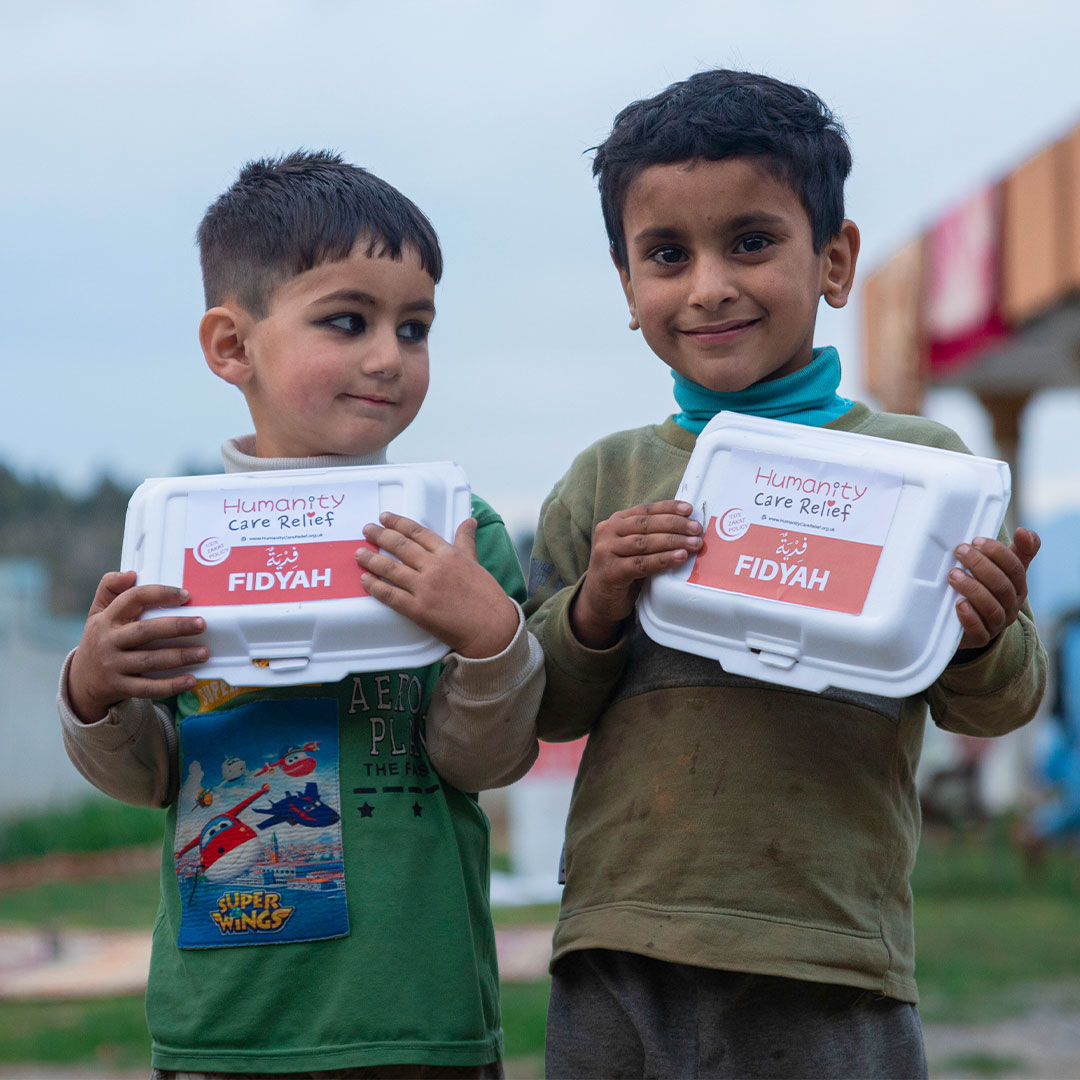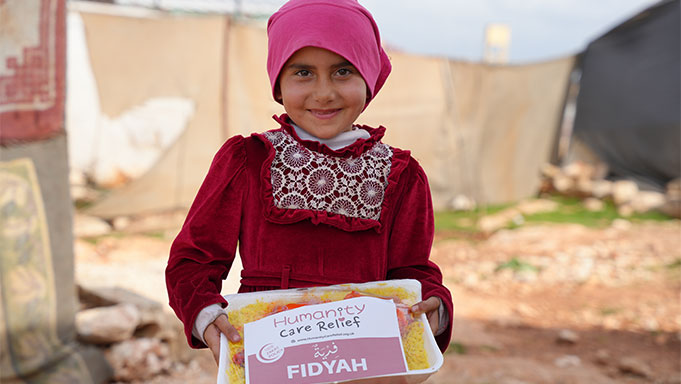Fidyah for Missed Fasts During Ramadan

Who must pay the Fidyah?
If Ramadan comes and a person is unable to fast because he is elderly or sick with no hope of recovery, then he is not obliged to fast because he is unable to do so. So he should not fast and he should feed one poor person for each day.
Allah says (interpretation of the meaning):
“O you who believe! Observing fasts is prescribed for you as it was prescribed for those before you, that you may become pious. [Observing fasts] for a fixed number of days, but if any of you is ill or on a journey, the same number (should be made up) from other days. And as for those who can fast with difficulty, (e.g. an old man), they have (a choice either to fast or) to feed a poor person (for every day). But whoever does good of his own accord, it is better for him. And that you fast is better for you if only you know.”
[Al-Baqarah 2:183-184]
Al-Bukhari (4505) narrated that Ibn `Abbas (may Allah be pleased with him) said:
“This has not been abrogated. It refers to old men and old women who are not able to fast, so they should feed a poor person for each day.”
Ibn Qudamah (may Allah have mercy on him) said in Al-Mughni (4/396):
“If fasting is too difficult for an old man or an old woman, and will cause them intense hardship, then they are allowed not to fast, and they should feed one poor person for each day. If they are also unable to feed a poor person, then they do not have to do anything, for “Allah burdens not a person beyond his scope” [Al-Baqarah 2:286]. If a sick person has no hope of recovery, he is allowed not to fast, and he should feed one poor person for each day, because he comes under the same ruling as an old man.”
Ibn Qudamah (may Allah have mercy on him) said in Al-Mughni (4/396):
“If fasting is too difficult for an old man or an old woman, and will cause them intense hardship, then they are allowed not to fast, and they should feed one poor person for each day. If they are also unable to feed a poor person, then they do not have to do anything, for “Allah burdens not a person beyond his scope” [Al-Baqarah 2:286]. If a sick person has no hope of recovery, he is allowed not to fast, and he should feed one poor person for each day, because he comes under the same ruling as an old man.”
In Al-Mawsu`ah Al-Fiqhiyyah (5/117) it says:
The Hanafis, Shafi`is and Hanbalis agreed that the Fidyah for not fasting should be paid when there is no hope of making up the missed fasts because of old age which makes a person unable to fast, or sickness from which there is no hope of recovery because Allah says (interpretation of the meaning):
“And as for those who can fast with difficulty, (e.g. an old man), they have (a choice either to fast or) to feed a poor person (for every day).”
[Al-Baqarah 2:184]
Example: If you or someone under your care has missed a whole month of fasting, you must pay £150, which will provide food for a person on a daily basis for 30 days.
Donate Fidyah for Missed Fasts During Ramadan and help feed the poor and the needy.
The Amount of Fidyah for not fasting
With regard to the manner of feeding, one has the choice between giving each poor person half a Sa` of food such as rice and the like (i.e., approximately one and a half kilograms) or making food and inviting the poor to eat.
Al-Bukhari (may Allah have mercy on him) said:
“As for an old man who is unable to fast, after Anas (may Allah be pleased with him) grew old, for one or two years he fed a poor person with bread and meat and he did not fast.”
Donate Fidyah for Missed Fasts During Ramadan and help feed the poor and the needy.
Image: Every year, tens of thousands of people benefit from your Fidyah donations during Ramadan.
What is the definition of the poor to whom the Fidyah for not fasting may be given? And how much should be given and when?
1.
It is not permissible for anyone who is able to fast in Ramadan, and who has no legitimate excuse, not to fast. Not everyone who does not fast because of a concession is required to feed a poor person for every day. Rather feeding the poor is required of those who are elderly or are suffering a chronic illness for which there is no hope of recovery.
Allah says (interpretation of the meaning):
“And as for those who can fast with difficulty, (e.g. an old man), they have (a choice either to fast or) to feed a Miskeen (poor person) (for every day).”
[al-Baqarah 2:184]
Ibn ‘Abbaas said:
This refers to an old man or an old woman who are not able to fast, so for each day they should feed one poor person.”
Narrated by al-Bukhari, 4505.
The person who is suffering from a chronic illness from which there is no hope of recovery comes under the same ruling as an old man.
Ibn Qudamah (may Allah have mercy on him) said:
The sick person for whom there is no hope of recovery may break the fast, and he should feed one poor person for each day, because he is like an old man.”(Al-Mughni, 4/396).
2.
As for what is to be given and how much, the poor person should be given half a saa’ (approximately one and a half kilograms) of the local staple food, whether it is rice, dates or anything else. If some condiment or meat is also given, that is better.
Al-Bukhari narrated in a mu’allaq report from Anas (may Allah be pleased with him) that when he grew old and was unable to fast, he did not fast and he would give bread and meat to a poor person for each day.
It is not permissible to give the equivalent value of the food in money.
Shaykh Saalih al-Fawzaan (may Allah preserve him) said:
Feeding the poor is not to be done by giving cash as you mentioned, rather it is done by giving the food that is the local staple food. So each day half a saa’ of the usual local staple food is to be given, and half a saa’ is equivalent to approximately one and half kilograms.
So you have to give this amount of the local staple food for each day, and do not give cash, because Allah says (interpretation of the meaning):
“And as for those who can fast with difficulty, (e.g. an old man), they have (a choice either to fast or) to feed a Miskeen (poor person) (for every day).” [al-Baqarah 2:184]
He specifically mentioned food. End quote.
Al-Muntaqa min Fatawa al-Shaykh Salih al-Fawzan, 3/140.
3.
The children, wife and family of a poor person on whom he is obliged to spend may be included in this number if they do not have enough to live on and there is no one else who can spend on them apart from this poor man.
Hence the poor man may be given zakaah that is sufficient for him and his family.
It says in al-Rawd al-Murbi’ (3/311):
The two types – i.e., the poor (fuqara’) and needy (masaakeen) – may both be given what is sufficient for them and their dependents. End quote.
4.
It is not essential that this poor person be an adult, rather the food may be given to a child who eats regular food, according to scholarly consensus. However, the imams differed with regard to giving it to a nursing infant. The majority of scholars (including Abu Haneefah, al-Shaafa’i and Ahmad) are of the view that this is permissible because he is a poor person who is included in the general meaning of this verse. The apparent meaning of the words of Imam Maalik is that food should not be given to a nursing infant, but he said that it is permissible to give it to a weanling. This view was favoured by al-Muwaffaq Ibn Qudaamah (may Allah have mercy on him).
See: al-Mughni, 13/508; al-Insaaf, 23/342; al-Mawsoo’ah al-Fiqhiyyah, 35/101-103.
This Ramadan – Help Alleviate Poverty
We are a UK-based international relief and development charity. Inspired by Islamic teachings of empathy, generosity, and selflessness, we focus on alleviating poverty and suffering across the world. We operate a 100% Zakat Policy, which means every single penny of your Zakat will go to the victims of poverty, wars, and natural disasters.
Before you support our Food Appeal, Water Appeal, Gaza Emergency Appeal, Syria Emergency Appeal, Yemen Emergency Appeal, Pakistan Appeal, or any Emergency Appeal, remember to make the intention that you are donating for the sake of Allah first and helping your fellow Muslim brothers and sisters second. This is very important because as Muslims, whatever act of worship we do, we do it for the sake of Allah.
Along with our emergency appeals, we are working on some amazing projects which will, Insha’Allah, bring prosperity to many Muslim homes from around the world. Donate your Sadaqah and Zakat to our projects like Build a Masjid, Livelihoods for the Poor, Sponsor a Widow, Sponsor an Orphan, Sponsor a Nikah, Donate a Sewing Machine, or help educate the Ummah by donating towards education projects, Sponsoring a Hafiz, Sponsoring a Child in Education, or supporting young people in university and Islamic education. Donate with confidence, Insha’Allah, every penny of your donation is your Amanah, and we will try our best to spend it on people who are in need.
Every year, we as Muslims celebrate two seasons the most: one, Ramadan, and two, the first ten days of Dhul Hijjah. During these blessed days, we put all our efforts into pleasing Allah سُبْحَانَهُ وَتَعَالَى by performing good deeds. Here at HCR, we provide you with the platform to perform an important act of worship: charity. In Ramadan, you can donate to the Ramadan Food Appeal, and Ramadan Zakat Appeal, Donate Fidyah for Missed Fasts During Ramadan, Donate Your Fitrana, and Pay Your Kaffarah for Breaking Oath or Breaking Fast, especially during the blessed nights of Laylatul Qadr. In Dhul Hijjah, we are here to help fulfil your duty of performing Qurbani. Whichever cause you choose, choose it with confidence. Insha’Allah.

